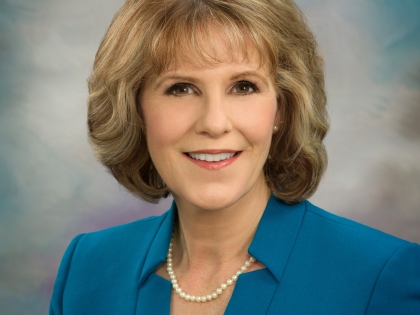
Milk Monitoring
Catharine Young
February 12, 2007

| P-J photo by Steven M. Sweeney |
By MANLEY J. ANDERSON - Jamestown Post Journal
Statewide milk price hearings on critical issues facing the dairy industry concluded late Friday morning at Jamestown Community College with presentations by concerned speakers. The hearings were designated as a State Standing Committee on Agriculture public hearing and sponsored by state Sen. Catharine Young, (R) Olean, and chair of the Senate Standing Committee on Agriculture. The opening speaker was Dr. Ronald Rosati, provost and vice president for academic affairs at Alfred State College, who said the region’s financial health depends heavily on the dairy industry and associated economic activity. He said the college is attempting to remove some of the risk of switching to organic farming, a transition usually requiring about three years, noting a grant program could assist in the transformation. Rosati also dealt with the potential for local marketing of dairy products and the impact of energy on dairy production.
He concluded with, ‘‘In summary, the Western New York dairy industry has priority needs for workforce development, development and transfer of new technology, unencumbered use of new technology, support for alternative markets, and support during the transition to the new energy economy.
The next speaker was Phyllis Couture, New York State Farm Bureau director representing Allegany, Cattaraugus, Chautauqua and Erie counties. She said the area has many dairy farmers that included her brothers and their families as third and fourth generations in dairying and who now are raising dairy replacements after selling off their about 125 milkers several years ago. Mrs. Couture said if milk prices had kept pace with college costs, dairymen now would be receiving $154 per hundredweight for their milk instead of $13.90. She said it is evident changes are needed to ensure the viability of the state’s dairy industry, with this seen as requiring a partnership between state, regional and national efforts.
The Farm Bureau spokeswoman said the state needs a dairy investment program to provide a short term cash infusion to dairy farmers in time of severe need. She said changes are needed in short term programs within the dairy industry, with reforms in workers compensation costs and investment tax credits seen as vital, with possible creation of five separate regional dairy marketing areas seen as helping provide dairy stability and viability within the state.
Mrs. Couture declared that a healthy, prosperous and vibrant dairy industry is critical to maintain the state’s agricultural infrastructure and general economic well bring.
Jim Ried, president/chief executive officer of Olean Wholesale Grocery Cooperative, gave the retail perspective on the Milk Price Gouging Law which he said presents many problems for retailers.
He said milk is one of the top five items in a supermarket for price recognition but is the only one that by law changes each month. Ried contended the best way to promote fluid milk is to have a retail
price structure that allows the consumer to know the retail selling price. The speaker said, ‘‘In the first six weeks of 2007 we have promoted beer, soda, water, juices and drinks every week; we have not set one fluid milk advertised feature. ... Government intervention causes nothing but confusion and the inability to merchandise milk with all other beverages.’’
Gerald George, owner of a 270-acre farm in the town of Chaffee which has more cows than people, said he began farming with two cows and 17 heifers, borrowing to increase his milking herd and equipment but dumping milk in a corn field to protest its low price. George said in 1987 he bought his farm at auction and had 105 head of cattle but the family broke up and he had to start farming again in the face of ever changing technology.
‘‘If a farmer cannot make a profit wth one cow it doesn’t matter how mny cows you have,’’ he said, citing numerous increasing costs on every farm. The speaker said the present situation is the worst he has seen in his 23 years of farming. George said he is seeking to help save a dying industry through organic farming and financial support by cooperatives.
The concluding speaker was Gary G. Latta, representing HP Hood LLC, a leading Northeast dairy manufacturer and regional/national distributor of a wide range of high quality dairy products marketed under numerous branded and private labels. He said the company he represents has about 5,000 employees, with nearly 1,200 of them living in New York State which on a dollar basis is the largest customer of farm milk in the state. Latta said advances in dairy science and farm management have led to tremendous gains in output per cow and explaining how milk prices are arrived at. He said New York continues its position as the nation’s third largest milk producer, while citing developing countries overseas as potential growing markets for quality dairy products. The speaker said New York should develop programs that encourage all producers to take full advantage of educational assistance and development of improved farm management practices.
Latta said the state’s Senate, Assembly and agriculture commissioner must bring Western New
York’s milk marketing area fluid milk prices into proper alignment with those in surrounding federal order markets.
He also made several other recommendations, including helping dairy farmers on the cost side, grants, low interest loans, tax incentives, reduced property taxes, electricity rates and affordable health care for employees. The concluding speaker declared, ‘‘New York’s producers, state legislature, processors and manufacturers must come together now. The dairy industry is evolving nationally and globally. New York must rise now and take positive steps to advantageously position ourselves for the future.’’
Sen. Young expressed appreciation and thanks to the speakers who took the time and made the effort to present their thoughts and views at the hearing.
Share this Article or Press Release
Newsroom
Go to NewsroomStatement from NYS Senator Catharine M. Young (R,C,I-57th District)
February 28, 2019
Town of Mansfield Slated to Receive $300,000 State Grant
February 27, 2019

Senator Young Secures $125,000 for Town of Ripley
February 27, 2019

